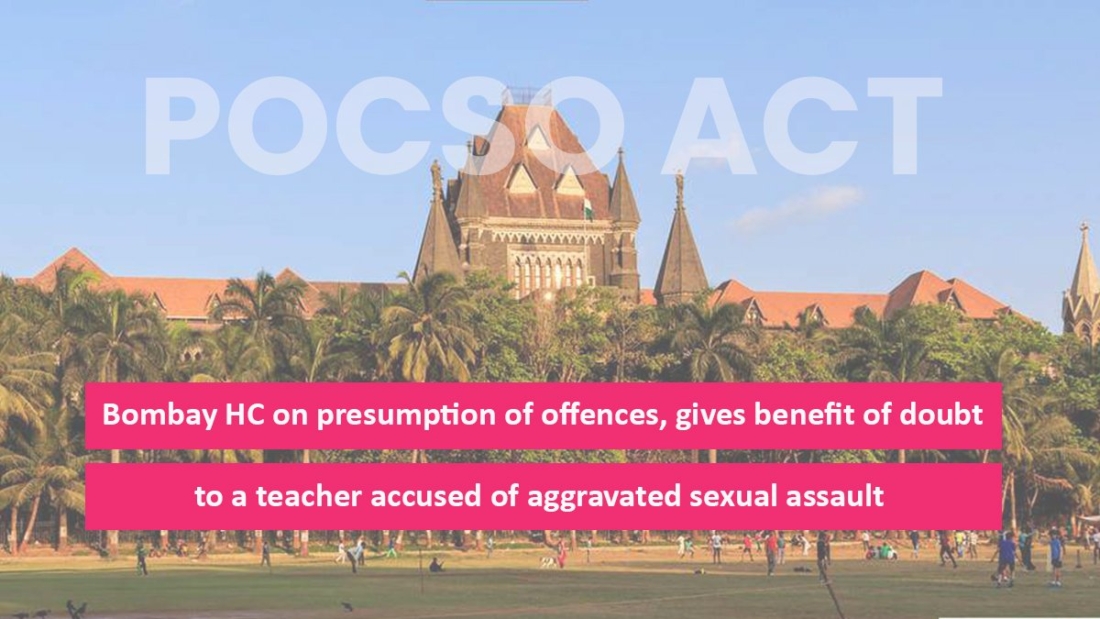In the case of Amol S/O. Dudhram Barsagade vs State of Maharashtra [Criminal Appeal No. 600/2017, Decided on 23 April 2018], the Bombay High Court rejected the submission that the statutory presumption under Section 29 of the Protection of Children from Sexual Offences Act, 2012 (“POCSO Act“) is absolute, and stated that if the foundational facts are not established, the prosecution cannot invoke the statutory presumption. For reference, Section 29 of the POCSO Act provides for presumption in relation to the offences of sexual assault, aggravated sexual assault, penetrative sexual assault and aggravated penetrative sexual assault. This essentially means that the burden of proof is shifted on the accused to prove that they are innocent of the alleged charges.
The facts are that the victim, a 10th standard student, was allegedly sexually assaulted and sexually harassed by her Mathematics teacher, the appellant-accused. The allegations are that while the victim was answering the Hindi paper, the accused (who was an invigilator during the exam) sat beside her and touched her breast. The accused then pressed her thigh. While the victim had not given any reaction till this point, when the accused again pressed the breast of the victim, she started crying and went to her room in the hostel leaving the answer-sheet behind. On disclosing the incident to the lady Superintendent of her hostel, the Headmaster lodged a report at the police station, under Section 354-A (sexual harassment and punishment for sexual harassment) of the Indian Penal Code (“IPC“) and Section 8 (punishment for sexual assault) of the POCSO Act.
The Sessions Judge framed charges under Section 354 of the IPC (assault or criminal force to women with intent to outrage her modesty) and Section 9(f) of the POCSO Act (aggravated sexual assault), and held the accused guilty and convicted him with rigorous imprisonment for 3 years and fine of INR 2,500 and rigorous imprisonment for 5 years and fine of INR 2,500 respectively.
Through an appeal in the High Court, the accused argued that the victim has falsely implicated the accused in order to escape the consequences of the unfair practice while answering the Hindi paper. The accused also argued that while the sole testimony of the prosecutrix can be relied upon, the testimony must necessarily be implicitly reliable, trustworthy and confidence inspiring.
Inclining towards the accused’s arguments, the Court held that the statutory presumption would stand activated only if the prosecution proves the foundational facts, and then, even if the statutory presumption is activated, the burden on the accused is not to rebut the presumption beyond reasonable doubt, rather, it would be sufficient to render the prosecution’s version highly improbable. The Court further held that the statutory presumption under Section 29 of the POCSO Act must be understood and tested on the principle that the accused is presumed to be innocent till the guilt is conclusively established beyond reasonable doubt. As per the Court, the prosecution in this case not only failed to establish unimpeachable and confidence inspiring evidence, their version creates a doubt about the veracity of the victim’s statements – in that, the fact that the Hindi test books were found on the bench of the victim is not conclusive, and the Investigating Officer failed to examine the 17 students who were present in the examination hall when the incident allegedly happened. As a result, the Court decided to give a benefit of doubt to the accused and acquitted him.
While there are other judgments that have taken a similar line of reasoning, this case is contentious because the POCSO Act, through Section 29, provides for an exception to the principle, ‘accused is presumed to be innocent till the guilt is conclusively established beyond reasonable doubt’ – whereas, the Court in this case has relied on this principle to reach the decision. In another case, Subrato Biswas v. State of West Bengal [CRA 011/2018 Cal., Decided on 11 June 2019] while the Court also holds that the prosecution has to lay down the foundation of the case by providing cogent and reliable evidence, it states that “a proper interpretation of Section 29 is that prosecution is absolved from proving its case beyond reasonable doubt but is only required to lead evidence to establish ingredients of offence on a preponderance of probability”. Therefore, there is contrary opinion on the matter.
– Aakriti Chokhani, Advocate & Associate, Child Safety at Work & Vaishali Jain, Paralegal, Child Safety at Work
 Cart is empty
Cart is empty 

